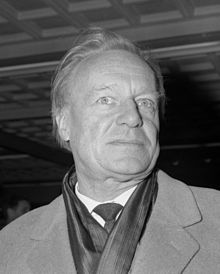André Cluytens

André Cluytens (French pronunciation:
Life and career
Belgium
Cluytens was born in
France
In 1932, he became the principal conductor at the
Cluytens volunteered to serve in the French army in September 1939 and following a medical examination was engaged as a French combatant, although he never saw action; he became a French citizen on 14 May 1940.[1] Following the liberation of France, complaints from Bordeaux concerning his alleged collaboration with Nazi authorities in that city led to him being sentenced as part of the épuration; after appeal, on 24 May 1946 his sentence was revoked.[1]
In 1947, he was appointed musical director at the
Having made his debut with the Paris Conservatoire Orchestra on 20 December 1942, he succeeded Charles Munch in 1949 as principal conductor, which post he held until 1960. His contract required him to conduct half of the orchestra's concerts each season; he also led them on foreign tours. Cluytens was due to conduct the first concert to be given by Alfred Cortot in Paris after his disgrace for Vichy activities, in 1947; in the event the concerto was dropped and Cluytens refused to acknowledge Cortot as he and the orchestra left the stage for Cortot to play solo.[5] Cluytens conducted the Paris Conservatoire Orchestra in a Beethoven symphony cycle and then on its tour of Japan in 1964,[6] continuing on his own to conduct the Sydney Symphony Orchestra, South Australian Symphony Orchestra, West Australian Symphony Orchestra, Victorian Symphony Orchestra and Queensland Symphony Orchestra into July that year.
International career
He led a famous performance of Wagner's opera Tannhäuser at the Bayreuth Festival on 23 July 1955, being the first conductor of French nationality to conduct at Bayreuth (and only the third non-German to conduct there, after Toscanini and de Sabata). His other work at Bayreuth up to 1965 consisted of Die Meistersinger von Nürnberg (1956, 1957, 1958), Parsifal (1957, 1965) and Lohengrin (1958), returning for Tannhäuser in 1965. According to Wolfgang Wagner, Cluytens was "universally liked for his amiable, open-minded attitude"; Hans Knappertsbusch was delighted when Cluytens requested that the older conductor introduce him to Parsifal.[7]
He was to introduce
Cluytens made his debut with the
From 1964 he had a close relationship with Anja Silja, whom he had met in Bayreuth[10] and first conducted in Salome at the Paris Opera. His death at the age of 62 occurred coincident with his reputation emerging not just primarily as a conductor of the French classics, but as an interpreter of the standard German/Austrian repertoire.
Cluytens died in 1967 at Neuilly-sur-Seine, France. The German soprano Anja Silja bought his former home in Paris and has resided there ever since.[11]
Recordings
A prolific recording artist, Cluytens signed a contract with the French branch of EMI
References
- ^ a b c d e f g h i Baeck E. André Cluytens: Itinéraire d’un chef d’orchestre. Editions Mardaga, Wavre, 2009.
- ^ André Cluytens. In: The New Grove Dictionary of Music. Macmillan, London and New York, 2001.
- ^ a b Sanders A. Liner notes to Andre Cluytens – A French Collection CDs. London, Testament, 2002.
- ^ Wolff, Stéphane. Un demi-siècle d'Opéra-Comique (1900–1950). André Bonne, Paris, 1953.
- ISBN 0300132905.
- ^ Holoman DK. Société des concerts du Conservatoire website Archived September 27, 2011, at the Wayback Machine Accessed 13 March 2011.
- ^ Wagner, Wolfgang. Acts (autobiography). Orion, London, 1994.
- ^ Tommasini, Anthony Régine Crespin, French Soprano, Dies at 80 . New York Times, July 6, 2007.
- ^ Obituary – André Cluytens. Gramophone, August 1967.
- ^ André Cluytens par Anja Silja, interview with Cécile Remy, Abeille Musique, 22 March 2002. Archived 2016-03-10 at the Wayback Machine Accessed 16 February 2011.
- ^ Michael White (2001-09-27). "A femme fatale faces the music". Telegraph. Retrieved 2007-02-18.
- ^ Cowan R. Replay – Rob Cowan rediscovers the art of conductor Andre Cluytens. Gramophone, May 2002, 104–5.
- ^ EMI IMG Classic Archive DVA4 90124-9, 2003.
- Holomon, D. Kern. The Société des Concerts Du Conservatoire, 1828–1967. page 476-7.
External links
- Société des concerts du Conservatoire
- Biography at All Music.com
- Short biography, Recordings and discography, Youngrok Lee's Classical Music
